11+ SAMPLE Leadership Coaching Proposal
-
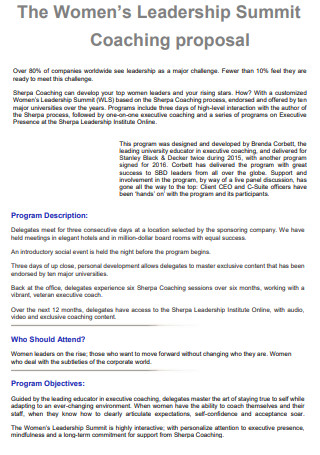
Women’s Leadership Coaching Proposal
download now -
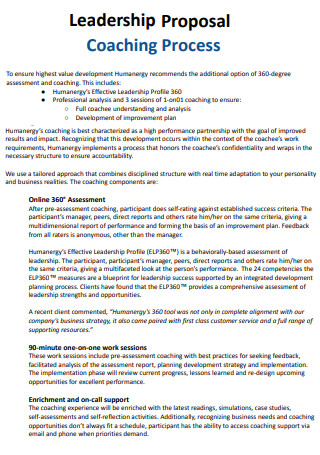
Leadership Coaching Proposal
download now -

Sample Leadership Coaching Proposal
download now -
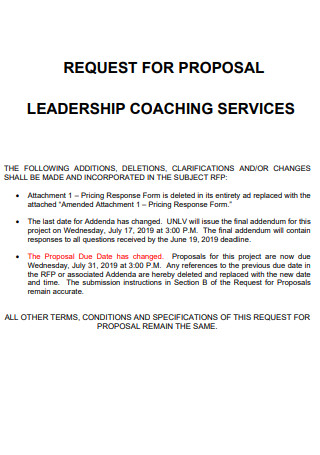
Leadership Coaching Service Proposal
download now -
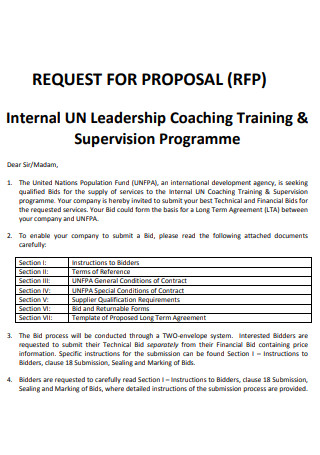
Leadership Coaching Training Proposal
download now -
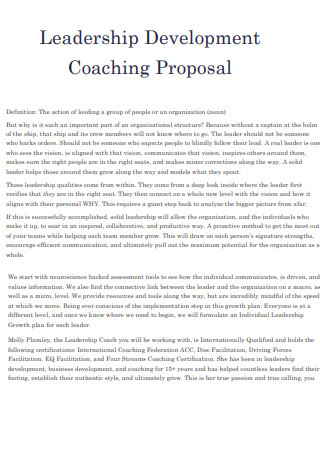
Leadership Development Coaching Proposal
download now -
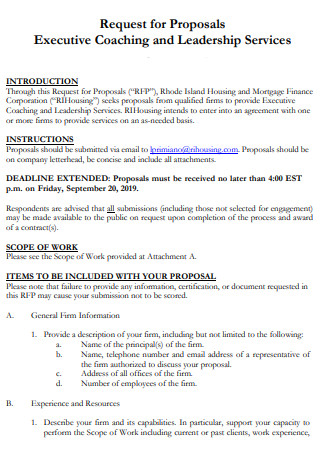
Leadership Coaching Request for Proposal
download now -
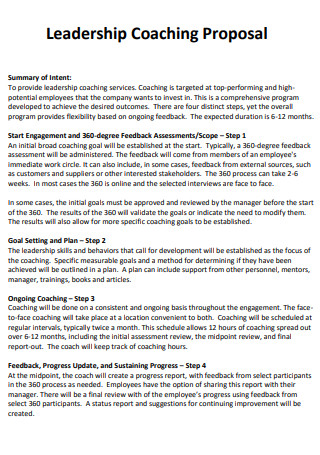
Leadership Coaching Proposal Example
download now -
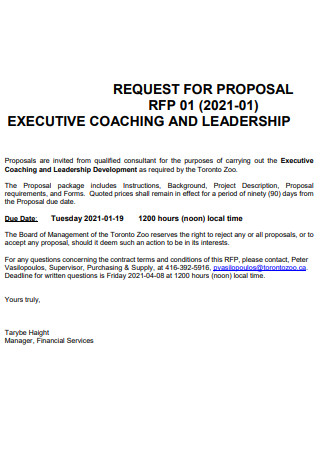
Leadership Executive Coaching Proposal
download now -
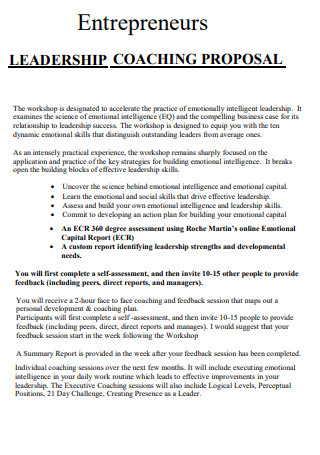
Entrepreneur Leadership Coaching Proposal
download now -
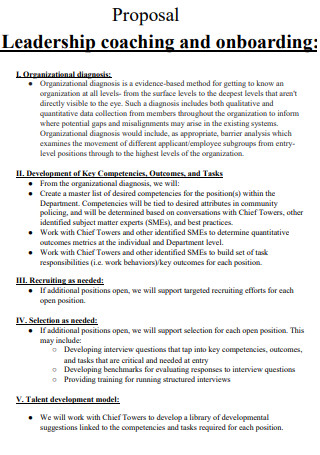
Leadership Coaching on onBoarding Proposal
download now -
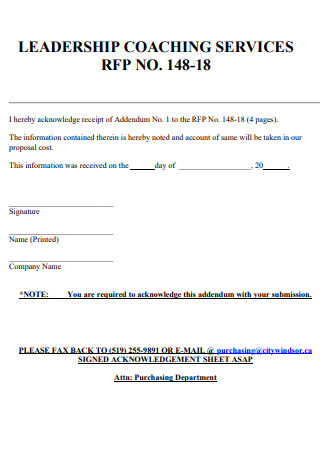
Leadership Coaching Proposal Template
download now
FREE Leadership Coaching Proposal s to Download
11+ SAMPLE Leadership Coaching Proposal
What Is Leadership Coaching?
Benefits of Leadership Coaching
Tips in Coaching
How Leadership Coaching Benefits Executives
FAQs
What does a leadership coach do?
What is a coaching model?
What makes a great coaching session?
What Is Leadership Coaching?
Leadership coaching is a powerful management training technique that enables corporate leaders to enhance their performance by maximizing their leadership skills. It facilitates awareness development through practice and direct feedback. According to statistics, 67 percent of respondents said leadership coaching boosted employee engagement and satisfaction.
Benefits of Leadership Coaching
Employees must be willing to learn, aware of their faults, accountable, and committed to self-improvement as the first and most crucial factor. And secondly, the leaders must have the expertise and experience in a specific area to instruct their followers. When these two criteria align, coaching leadership becomes a potent tool for an organization. To accomplish a procedure advantageous to all sides, the employees and the leader complement one another. If you’re still intrigued, here are a few of its advantages:
Tips in Coaching
Coaching is an integral component of modern employee management. Due to the rapid rate of industry change and the monthly demand for new abilities, you must help your employees learn and develop consistently. Two-thirds of millennials expect their bosses to help them advance by providing opportunities for professional development. Coaching your staff and assisting them in their product is a sign of a great leader. Here are the top five strategies for coaching your team to success and becoming a great leader.
1. Emotional intelligence
Coaching is about more than just the employee. A significant portion of coaching is your interactions with each team member. You’ll be far better positioned to help your colleagues overcome obstacles and function as a team if you can be straightforward with them, comprehend the challenges they may experience in their role, and are sensitive to possible opposing viewpoints. Being more conscious of and enhancing your emotional intelligence will make you better equipped to support and advise others; it’s not surprising that great leaders have above-average emotional intelligence levels. Being emotionally intelligent demands a focus on both understanding your perspective and having the ability to empathize with others. This offers the foundation for working closely and personally with your team.
2. Recognize each person’s strengths
Coaching is not an all-inclusive approach. Customizing your attention to the individual with whom you are interacting is essential. Each teammate adds something distinctive to the table. As a manager, your responsibility is to identify each employee’s strengths and develop these talents through a customized coaching plan. You can plan and execute projects more efficiently if you genuinely grasp the individuals who make up your team and what they need to achieve.
3. Ask questions
Effective communication and asking people what they want from the coaching process go hand in hand. Rather than constructing a growth plan based solely on their skills, include them in the conversation by asking what excites them, what they’d like to learn, and where they’d like to go in the future. It is essential to help employees develop their evident skills, but don’t overlook the possibility that they have hidden talents yet to be uncovered. It demonstrates that you value your employees and are prepared to assist them in achieving their objectives by attentively listening to their input and modifying your actions accordingly. They should be aided on their path to professional advancement by the coaching you provide. However, ultimately the most effective technique is to use these dialogues to empower children to take charge of their development.
4. Empower them
Once you’ve determined your employees’ capabilities and career goals, it’s time to assist them in applying those skills. Start by assigning each person assignments that will aid their development in their core areas. This may be giving stretch assignments, allowing them to take the lead on a new project, or encouraging them to lead a sales call. The best method to learn is by doing; the more independence you grant them, the more your trust and faith in their talents. It is crucial to let your workers know that you do not expect them to develop overnight. There will be obstacles during the development process, but that’s why you’re there to assist. Regularly checking in with them will demonstrate that you are available for help and comments without compromising their autonomy.
5. Feedback is key
Individual development is impossible without feedback. If your staff is unaware of where they can improve, they cannot make changes or truly build upon their successes. The most critical aspect of becoming a great coach is providing effective real-time feedback. Not only is it necessary to provide timely constructive comments, but also to recognize and celebrate accomplishments.
How Leadership Coaching Benefits Executives
Can you conceive of a professional athlete who does not have a coach? Of course not. Athletes utilize coaching to improve their game and become more effective with their teammates. Athletes utilize coaching to continue to perform and thrive in a dynamic and competitive environment even when they are at their best. All leaders, including executives, require mentoring for the same reasons. Considering how individuals might learn and grow from leadership development coaching and the above-mentioned positive outcomes is essential.
1. Self-awareness
Self-awareness is one of the leading development areas for all types of coaching. While a leader may be content with his performance, others on the team may have a different perspective. It is also possible for the leader to be overly self-critical or suffer from imposter syndrome when others believe she is performing admirably. Or perhaps the leader is performing well overall, but certain behaviors or beliefs cloud their perspective or reduce their effectiveness. They may be unaware of how an idea or mentality influences their approach or is perceived by the team. Lack of self-awareness leads to a failure to see the significance of the nuances and viewpoints offered by others, which fails to identify the best solutions and strengthen vital connections. It can inhibit creativity and innovation, so it demotivates a workforce. By gaining awareness of automatic thinking and many other actions, thoughts, and emotions, leaders can begin to engage differently with themselves, their team, and other people in their life.
2. Communication style
Developing self-awareness regarding your verbal and nonverbal communication abilities might be a game-changer. It is simple for leaders to neglect communication as a skill, at least until the need becomes apparent. Possibly it’s a novel circumstance or an interpersonal obstacle. In either instance, leaders may discover that their typical communication style is ineffective. Setting clear goals, providing constructive feedback, and modifying a leader’s nonverbal communication are all ways to coach a leader to communicate more successfully. In addition, leadership coaching can assist leaders in creating a more inclusive and supportive environment for their teams by reviewing the language they employ with others.
3. Listening skills
Are you actively listening? Are you hearing what others are telling, or are you simply waiting till the person opposite you finishes speaking so that you may talk? Listening is a more significant component of effective leadership than most would assume. Leaders can unlock many potential benefits for themselves and their teams by developing their listening skills and sensitivity to others. A coach can aid in developing leadership-critical communication and active listening skills.
4. Self-regulation
Leaders do not exist in a vacuum. Instead, they continually interact with others, which has an effect. We know from our research and that of others that these day-to-day contacts with a manager have the most significant impact on direct reports’ sense of belonging and inclusion, work satisfaction, and autonomy. Therefore, a leader’s inability to control their emotions can impair their judgment and badly impact the environment and experience for everyone else. Effective leadership coaching can assist a leader in moderating their emotional responses. By recognizing methods to take a step back, they afford themselves the chance to regain composure and resume a more productive conversation. Developing the ability to self-regulate may involve recognizing trends and potential triggers to reduce their influence on the leader and their team. Identifying the present feeling can go a long way toward aiding in managing responses to diverse situations.
5. Growth perspective
Individuals can acquire a growth mentality through leadership coaching instead of a fixed one. With this perspective, leaders can view challenges as chances for progress rather than as something to fear or dread. Developing the ability to be adaptable, recover from failures, and think imaginatively is a potent skill. Some influential leaders of the last several generations exhibit the capacity to think holistically and a dedication to improvement. When obstacles arose, they did not view them as roadblocks. Instead, they sought expansion chances for their product, company, or team.
6. Develop empathy
Ever heard the adage, “Nobody cares what you know until they know how much you care?” This is about empathy in essence. Leaders who rapidly access their compassion for others are more effective in their positions. Senior leaders can bring value by recognizing an employee’s suffering while experiencing difficulty. This enables employees to view leaders as a place where they may express their truth when they are mainly stuck or challenged. It is not necessarily the leader’s responsibility to find a solution to the problem, but rather to seek understanding and methods to help their staff during difficult times better.
7. Leverage strengths
Leadership coaches are particularly excellent at assisting others in recognizing their talents. Not how one might respond to an interview question, but a thorough evaluation of a coachee’s abilities and how to best capitalize on them. Strengths are frequently individualized. With the assistance of a coach, a leader can utilize their unique skills in novel and unexpected ways.
FAQs
What does a leadership coach do?
A leadership coach is a professional and experienced guide and businessperson who understands the workplace and gives a leader a safe environment to discuss pressing or emergent challenges and concerns. The overarching objective is to uncover unrealized potential in individuals and organizations.
What is a coaching model?
A coaching model is designed to lead individuals from their current position to their desired position. A coaching model is intended to provide a framework for helping another individual through the following steps: determining a desired objective.
What makes a great coaching session?
A skilled coach draws others’ attention to well-defined and particular challenges. Being vague about problem areas or failing to bring them up with the relevant parties indicates a lack of leadership and a disinclination to promote constructive change.
Do not worry if this is your first time creating a leadership coaching proposal. Understanding the fundamentals of the coaching proposal writing process can make creating a good paper more accessible and efficient, even though it may be scary to begin. Start by reviewing the content and structure of the examples available for download on this page.
